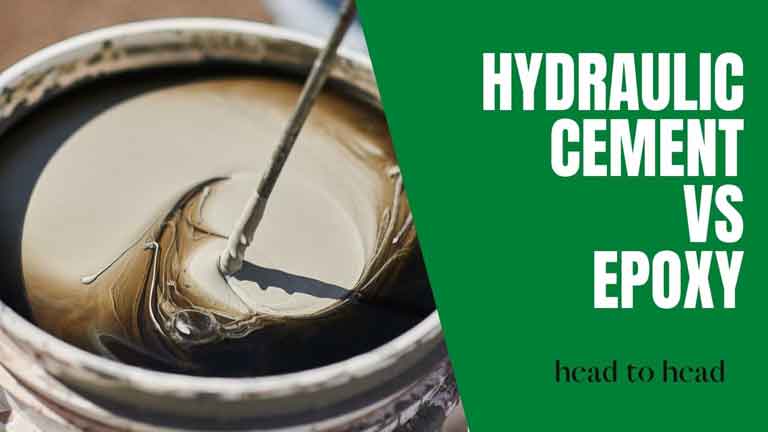Have you ever wondered how Epoxy and hydraulic cement differ from each other? If yes, then you have come to the right place. Epoxy and hydraulic cement are construction material types.
They are useful in constructing buildings, floorings, staircase, and pathways bridges. We also use them in repairing damage as well. This article covers all the differences between Epoxy and hydraulic cement.
Epoxy is a thermosetting polymer with a resistant property, whereas hydraulic cement is a glue that hardens when combined with water.

Differences Between Epoxy and Hydraulic Cement
Here are the 7 differences between hydraulic cement and epoxy-
Nature of Material
Epoxy is generally known as epoxy resin formed by the combination of two polymers. Its usage is in the industrial business for making paints, varnishes and adhesive material.
This material is also used in flooring, primers and sealers. It is a glue that gets attached to all sort of construction material. However, it is used for lamination purpose mainly. They are used to stick thing to concrete.
Epoxy has a volatile nature, so its fumes have a strong smell making the application job complex, sometimes.
Whereas Hydraulic cement is not a polymer or adhesive, it is a binder that consists of hydraulic Calcium silicates. It is composed at high temperature by mixing lime, gypsum and clay.
Hardening Time
Epoxy is a resin that sticks to the surface. It is exposed to a high temperature or a hot fan to solidify it. After applying Epoxy, use a heat lamp or hot air gun to harden it.
Epoxy generally hardens quickly, but the complete hardening of Epoxy takes several days to set. If Epoxy does not dry, keep it close to the hot temperature and wait for the chemical reaction.
Hydraulic cement is instant hardening material. Hydraulic cement does not require any heating process for hardening. If one applies hydraulic cement to small areas, they take a few minutes to harden. If used to a large extent, they take a few days.
Conditions
Hydraulic cement only requires water for its activation. There is no other thing needed for hardening. It does not lose its properties while in contact with water. It is the primary advantage of hydraulic cement.
It provides durability in any weather conditions. Whereas Epoxy only harden when exposed to hot temperature. If treated above room temperature, they solidify below room temperature. They won’t perform well.
Sticking Property
Epoxy resin, if not appropriately mixed in an accurate ratio, will not solidify. Measure the two ingredients appropriately of Epoxy, resin and hardener, and mix them warm to hot temperature.
Sticky resin is only resulting when the two are not combined thoroughly. The cold weather while mixing can also leave sticky resin.
Hydraulic cement, when added with water, gives solidification. It can be mix at room temperature or below room temperature. Also, it does not need a perfect measuring of water and cement to mix.
Underwater Performance
Hydraulic cement becomes more popular because of its under-water usage. It is the best choice of projects which needs construction underwater.
When treated with water before 100% curing (hardening), Epoxy can cause a tacky cloudy looking coat. Whereas Marine epoxy is the type of Epoxy that is best for use on the surface, which will keep in continuous touch with water.
Used in Paints
Water-based epoxy paints are available in the market that is perfect as a protective coating. These are right on factory cast iron and cast aluminium applications as the material come with the water-resisting ability.
They are less volatile and safe to use. Since, these are less flammable, you can use these to coat the tabletops of the kitchen.
On the other hand, hydraulic cement is only for construction purpose. It cannot add to paints. Once the construction is complete, you have to wait for the cement to get dry. Paint it on the top as ordinary cement.
Decorative Purpose
Hydraulic blocks of cement are mainly for construction purpose. It can also use for covering the broken patches of the floor. They are not for decorative purpose. Hydraulic cement is a concrete material. You cannot use anything else but water to mix in hydraulic cement.
At the same time, Epoxy resin is for a fancy coating of the floor. They are mainly to cover the top of the base and making it look glazed. Epoxy flooring serves a high performance and decorative purpose.
They come in different colours and designs. Different textures, decorative pieces and paint chips are incorporated in Epoxy to make them more attractive. Epoxy is also best to cover countertops to make them look shiny.
Conclusion
Hydraulic cement and Epoxy are both construction material, but both have a different nature. One is for making the foundation of a building, but Epoxy is mainly serving for decorative purpose.
Both give good durability and long-term efficiency. Epoxy is not for filling the holes and gaps like hydraulic cement. Epoxy, in comparison to hydraulic cement, are slightly expensive, including maintenance.
Leave a Reply